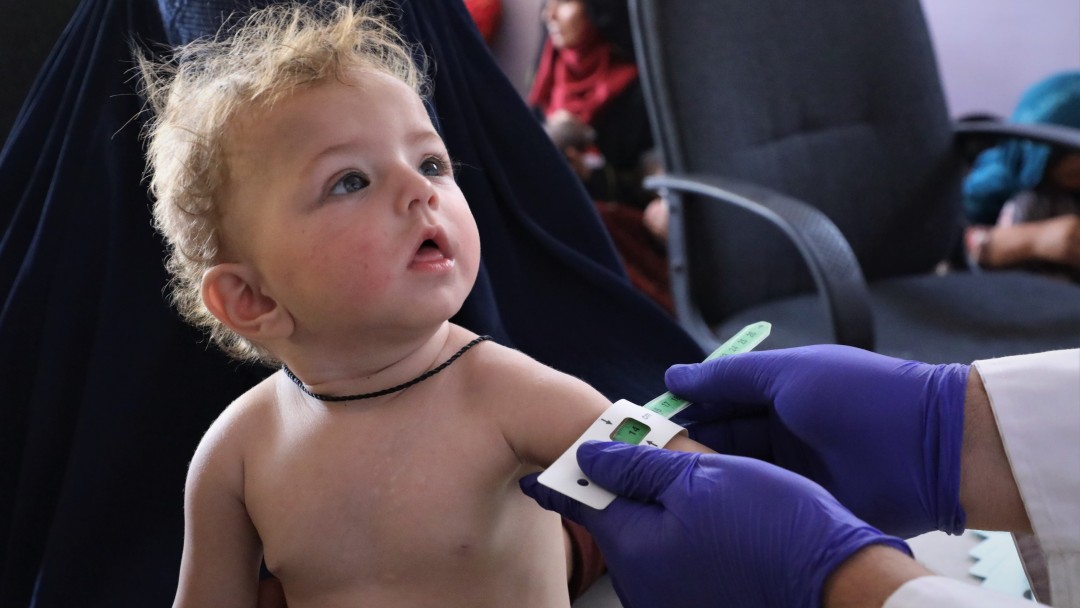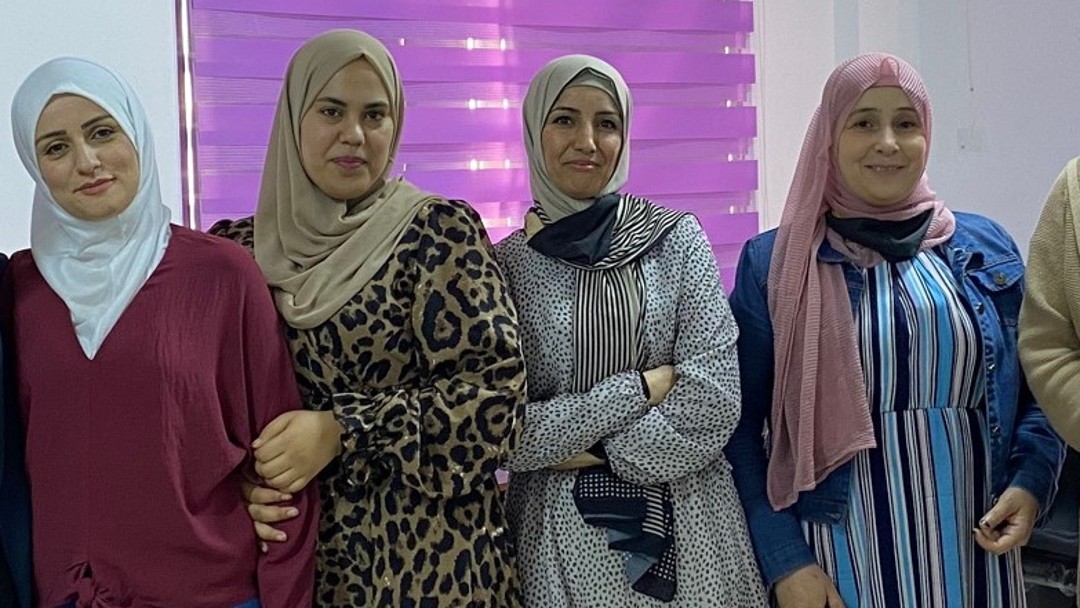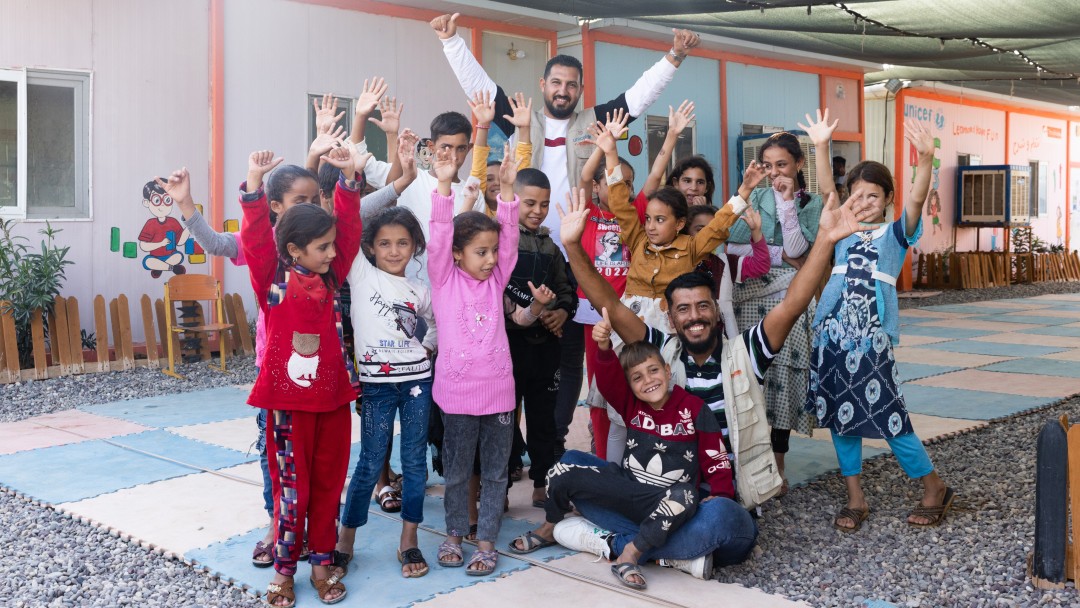News from 2022-11-17 / KfW Development Bank
International Children's Rights Day
20 November is International Children's Rights Day - the day the UN Convention on the Rights of the Child was adopted in 1989. It ensures universal rights for every child - regardless of origin, gender, religion, or social status. Due to war, the climate crisis and the consequences of the Covid 19 pandemic, the situation of many children in the world is dramatic. KfW Development Bank cooperates with UNICEF, especially in Africa and the Middle East, in very different programmes, e.g. support for refugees, basic education and food security. In 2021, KfW committed EUR 405 million to 30 UNICEF projects, the funds are provided by the Federal Ministry for Economic Cooperation and Development (BMZ). In the following, we illustrate the diverse commitment with three examples.
Afghanistan

Malnutrition is one of the biggest challenges for children, young girls, and women in Afghanistan. More than half of the population is chronically malnourished. Many mothers can only feed their children twice a day, and often only with bread and tea. They cannot afford nutritious food such as fruit, vegetables, or eggs.
"Access to food is a basic human right that is all too often denied, especially to women and children," says Svenja Schulze, Federal Minister for Economic Cooperation and Development. "The contribution of German development cooperation to UNICEF reflects the feminist approach of German DC, which addresses the special needs of women worldwide." The German government is providing a total of EUR 45 million through KfW this year and next to improve nutrition for children and women in Afghanistan. The programme also includes training community health workers and health facility staff, as well as providing micronutrient powders for children and iron and folic acid supplements for teenage girls to give them the vitamins and minerals they need. 3,000 needy families will receive unconditional, unrestricted cash assistance to buy nutritious food. The project will be implemented over a period of 36 months in 13 provinces.
Jordan

The project "Support of the Education Sector by Syrian Refugees" provides short-term employment (‘volunteering opportunities’) for Syrian refugees in Jordan who face difficulties entering the Jordanian labor market due to limited access to work permits. They work as support staff in non-formal learning centers for vulnerable Jordanian and Syrian children and youth (known as Makani centers), as well as in government schools in host communities and in the refugee camps Azraq and Za'atari. The received income significantly improves their living conditions enabling them to better provide for their families.
In Makani centers they are involved as trainers, for example in the areas of psychosocial support and child protection or, like one of the women in the picture, in early childhood development. In mother-child courses for vulnerable families, she discusses challenges in everyday parenting with the mothers, works out solutions with them and provides helpful knowledge about early childhood development. At the schools, the Syrian refugees support the Jordanian teachers who teach Syrian refugee children in the afternoon shift: i.e. as intercultural mediators and trusted mentors for students and their parents. In 2022, around 1,200 Syrians have been employed under the project so far, including around 680 women (56%).
For Syrian women in Jordan in particular, employment under the project is a great opportunity to work outside the home and provide their families with the necessary income. They use the skills they previously acquired in Syria, while at the same time being able to further their education through accompanying training. Up to 158,000 children in schools and 60,000 children in Makani centers benefit annually through the work of Syrian refugees.
Funded by KfW through the BMZ Special Initiative on Displacement the project is implemented by UNICEF Jordan.
Irak

The humanitarian situation in Iraq is largely a legacy of the conflict with the so-called Islamic State from 2013 to 2017, which resulted in increased migration movements and an overload of already scarce state resources. A total of around 6.2 million Iraqis are now considered internally displaced persons (IOM Displacement Tracking Matrix); as of 30 September 2022, almost 5 million of these have already been able to return to their home areas or host communities. 2.5 million people - including 1.1 million children - are also in a humanitarian emergency in Iraq, according to the Humanitarian News Overview (HNO) of 2022.
KfW Development Bank has been cooperating with UNICEF in Iraq since 2016. In a further phase of the "Education, Child Protection and WASH (Water, Sanitation and Hygiene)" programme, which is due to start soon and for which EUR 35 million is available, measures will be implemented in the following components: WASH, Education, Child Protection, Social Protection and Inclusion and COVID-19. What is happening specifically? The public water supply and sanitation facilities are being built or renovated, public education services are being expanded, and child protection services and social security measures are being established. In Iraq, too, prices have risen sharply due to the war in Ukraine. Almost 1.4 billion people - half of them girls and women - will benefit. The geographical focus is on the governorates of Anbar, Baghdad, Ninewa and Kirkuk as well as in governorates of the KRI (autonomous region of Kurdistan).
Through the rehabilitation of schools and the provision of teaching and learning materials, children and adolescents are given access to basic education, complemented by Back to Learning and mobilisation campaigns to make parents, communities, and teachers aware of the importance of school attendance. The target group is primarily children from returned or internally displaced families or who are not currently in the education system. In Jeddah Camp - see photo - there are currently a good 4,000 internally displaced persons, half of them younger than 17. Many cannot return home - because there is no employment there or because birth certificates are missing. The children are often exposed to domestic violence or forced to work. In child protection centres - child-friendly spaces - children and adolescents can learn and play in a safe environment and they also receive psychological support in dealing with traumatic experiences and losses. In 2022, more than 2,000 children - a good half of them girls - could be cared for in the camp.

Share page
To share the content of this page with your network, click on one of the icons below.
Note on data protection: When you share content, your personal data is transferred to the selected network.
Data protection
Alternatively, you can also copy the short link: https://www.kfw-entwicklungsbank.de/s/enzBWrMC.CzwA
Copy link Link copied